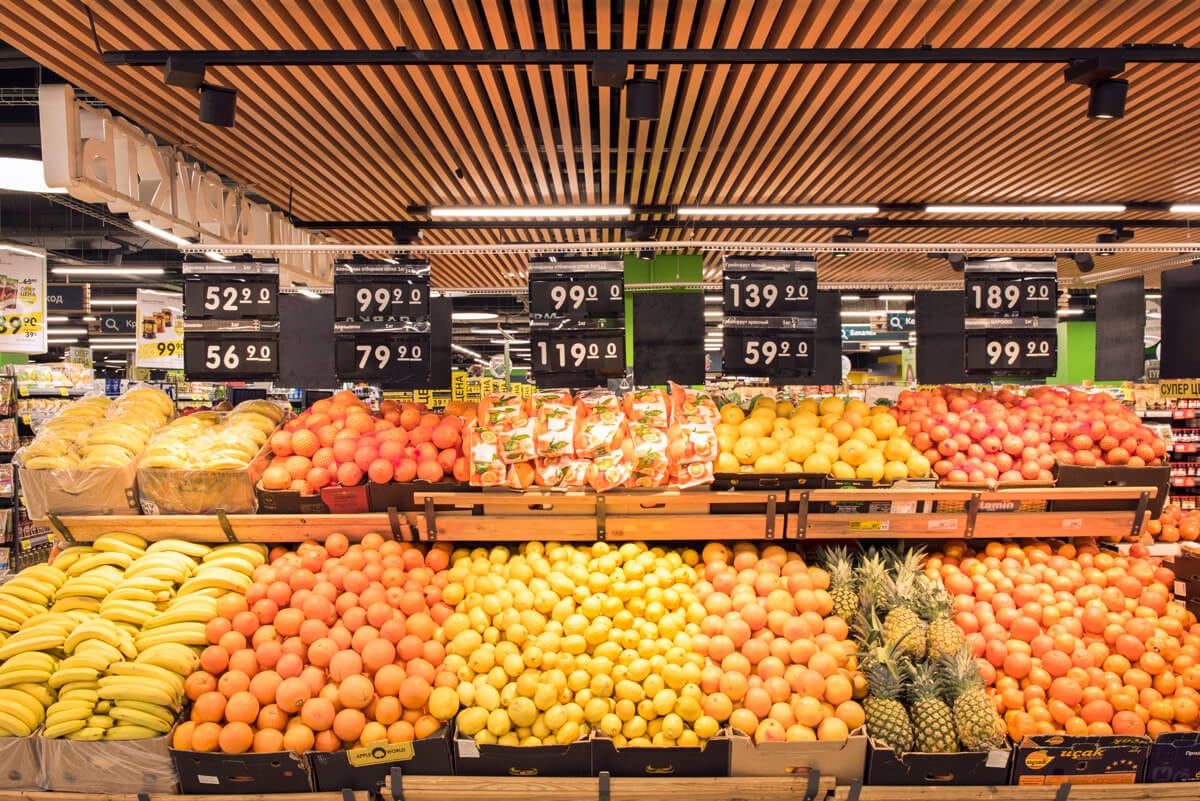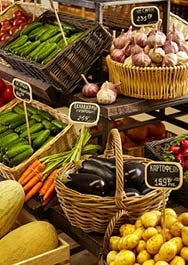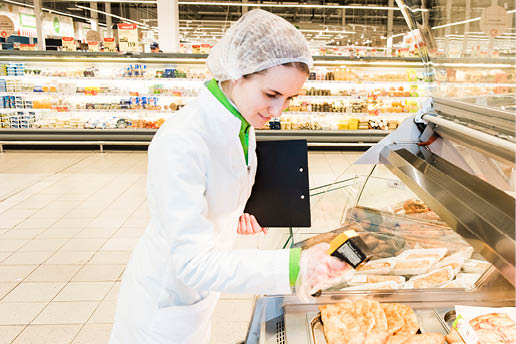1.6 Product safety and production quality
At X5, we aim to offer our customers fresh, high-quality products at every store we operate. This requires maintaining and adhering to consistent policies and systems that cover the entire product chain, from before it is delivered to a warehouse or store all the way to the end consumer. The policies and systems that we implement comply with all Russian legislation and regulatory requirements and also draw on global best practices in the food retail sector.

2017 in numbers
items tested and accepted into the product matrix (approximately 12% more than in 2016)
2,268
stores audited in 2017, 16% more than in 2016
174
suppliers audited
14,294
random samples of stores’ in-house products sent for testing
728
internal quality audits carried out at hypermarkets
5,303
random samples taken from employees’ hands for lab-based hygiene testing

Across all of our formats, we implement a clear set of rules and guidelines regarding the quality and safety of what we sell. Our quality control systems span our operations, from supplier audits to monitoring and checking the goods on shelves in stores.
Our ongoing goal is to improve safety and quality practices in our supply chain and retail operations. In order to do this, we are constantly seeking out and implementing recommendations on best practices from leading inspection, verification, testing and certification companies.
Our retail formats each maintain their own quality and safety monitoring policies, which are based on the following principles:
- Understanding the current and future needs of consumers, meeting their stated and unstated goals, aspiring to exceed their expectations
- Ensuring food safety and social responsibility
- Specifying the quality level based on the end user
- Establishing and maintaining mutually beneficial partnerships with producers and suppliers
- Creating and maintaining a corporate culture in which all of a format’s employees are fully engaged and interested in achieving their goals, using their knowledge and experience
- Running formats using a process- and systems-based approach to the various stages of a product’s life cycle: starting with the development and entry of goods into the assortment, to production, to sale to the consumer
- Introducing modern quality management methods to improve the efficiency and effectiveness of the organisation in ensuring food safety
- Continuous improvement as a permanent goal
As the largest food retailer in Russia, X5 works closely with federal regulators and decision-makers to draft documents, including food standards, legislative proposals, regulations and consumer rights protection proposals.
In order to maintain a dialogue with all stakeholders, X5 also works with industry associations, including the Consumer Market Participants Union, the Russian Union of Industrialists and Entrepreneurs, the All-Russian Association of SMEs (Opora), the Civic Chamber of the Russian Federation, the National Dairy Producers Union, the RusBrand Association of Branded Goods Manufacturers, the Seafood Processors Union and the RusProdSoyuz Association of Food Manufacturers and Suppliers.
The Quality Department is responsible for establishing safety and quality standards and product specifications at the Corporate Centre level, and all of these requirements are agreed with the Commercial Department. The Quality Department receives and analyses information about internal audits and supplier audits and monitors whether standards are being adhered to. It is the shared responsibility of the Quality and Commercial Departments to respond to incidents of non-compliance by taking measures to eliminate shortcomings and help suppliers develop their systems or products properly. The two departments produce periodic reports for management review.
In addition, our retail formats regularly engage accredited international auditors to conduct audits of their suppliers, and update quality specifications and standards for food products, private labels and packaging on an ongoing basis.
X5 deploys the principles of Hazard Analysis and Critical Control Points (HACCP) to ensure that its products are safe for consumers and the environment, and that they meet retail standards and customer needs.
Other quality assurance practices that we use include:
- lab testing and analysis at research and development centres and accredited research laboratories;
- staff training;
- safe storage and handling of products;
- modern monitoring methods, innovative technologies; and
- supplier audits.
Introducing goods to our product range
All potential suppliers supply us with samples and documentation certifying the quality, safety and origin of their products before signing a supply contract with X5. The Company’s quality experts then ensure that suppliers meet both X5’s and regulatory requirements.
In 2017, Pyaterochka initiated a project to automate the process of introducing goods into the assortment matrix, which will enable the format to streamline this process, automate it and create a database to analyse supplier errors that impede stable cooperation with them. This data will also be used to help suppliers improve in order to avoid risks associated with errors that may entail fines from the regulatory or oversight authorities.
Acceptance at distribution centres
Our distribution centres carry out testing to ensure that all incoming food products comply with X5’s standards of appearance, texture, taste and smell, as well as with Customs Union and Russian national regulatory requirements. X5’s quality control for fruits, vegetables and exotic fruits meets national standards and those of the United Nations Economic Commission for Europe (UNECE), as well as X5’s own quality catalogue and acceptance criteria, including calibre, size and ripeness.
In 2017, Pyaterochka continued implementing the “Remote Acceptance” project at DCs and hubs. This project enabled the format to reduce losses by using video monitoring, random sampling and reducing corruption risks.
The Company also initiated a project in 2017 to improve the monitoring of the supply of chilled goods from the supplier to the store shelf. As part of this project, all of Pyaterochka’s DCs and hubs were equipped with equipment that enables personnel to take a proactive approach to product quality and safety, thereby increasing the level of responsibility of personnel.

Quality control in stores
Under our Quality Hour programme, all products on our shelves are sorted and checked for quality and freshness every morning between 9 a.m. and 10 a.m. Pyaterochka store directors are personally responsible for product freshness in their additional role as “freshness directors”.
All of our formats regularly audit stores to monitor compliance with safety and quality standards, which means we are able to address issues quickly as they arise and improve the quality of the service we offer to customers.
| 2017 | 2016 | 2015 | |
|---|---|---|---|
| Pyaterochka | 2,268 | 1,956 | 702 |
| Perekrestok | 907 | 427 | 305 |
| Karusel | 728 | 265 | 212 |
| X5 total | 3,903 | 2,648 | 1,219 |
Interaction with consumers
In addition to a customer hotline, X5 regularly monitors social networks, blogs and online forums for potential complaints. We thoroughly investigate all customer complaints about product safety and quality. This verification process may involve making control purchases and sending samples for analysis.
We regularly publish the results of our quality monitoring procedures on the Quality section of our website to ensure full transparency for our customers and to ensure that all of our products are genuine and high-quality. Products found to be in breach of quality and safety standards are immediately taken off the shelves and returned to the supplier.
Audit of branded and private-label products
A supplier audit is one of the criteria for selection and rating of suppliers. The Supplier Audit Programme is available on the supplier portal along with a requirements checklist. All new suppliers undergo a mandatory audit to ensure that their production facilities are compliant with quality and food safety requirements.
During the year, all of X5’s formats conducted audits of suppliers, while samples of product items were sent to independent, accredited testing facilities for analysis. The analysis was aimed at verifying the products’ organoleptic, physical, chemical and microbiological properties and, in some cases, the declared ingredients, specifically to identify any replacements with cheaper alternatives and any use of food additives, artificial colourants, sweeteners or preserving agents not indicated on the label.
X5’s supplier evaluation criteria are applied across the group, so that all of our brands are able to use the audit results from one format. In addition, our call centres have established procedures for handling customer complaints about private-label products.
| Producer | Pyaterochka | Perekrestok | Karusel |
|---|---|---|---|
| Number of audits 2017 | 977 | 174 | 33 Karusel uses Pyaterochka’s database |
| Number of audits 2016 | 939 | 167 | 14 Karusel uses Pyaterochka’s database |
| Change, y-o-y (%) | 4 | 4 | 136 |
_150.JPG.jpg)
In 2017, items were sent to independent, accredited testing facilities for analysis as follows:
Interaction with public authorities and self-regulating organisations
In 2017, the Quality Department drafted over 100 proposals on refining existing legislation and amending specific legal acts regarding technical regulation, accreditation and standardisation, food product quality and safety, veterinary control and supervision, sanitary and phytosanitary measures and consumer rights protection.
In 2017, the Company also signed an agreement with the Russian Federation Federal Service for Veterinary and Phytosanitary Surveillance to begin using an electronic system for tracking veterinary documentation of meat and poultry products. Starting from January 2018, paper forms of veterinary certificates were replaced with electronic forms, which are issued by the Mercury FGIS. This will not only help ensure the traceability of goods, but will also reduce paperwork and, as a result, achieve tangible savings and optimise costs associated with this process.